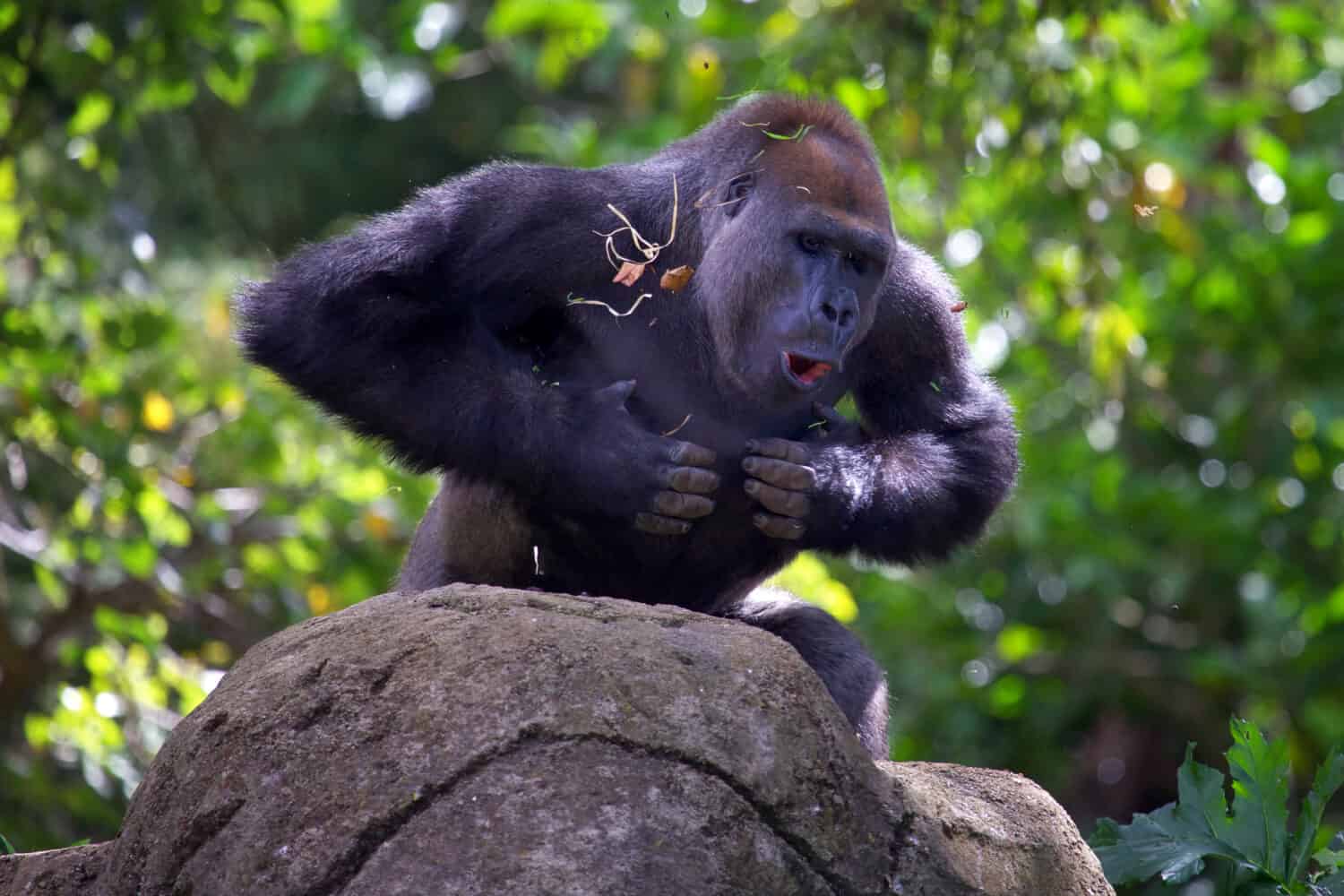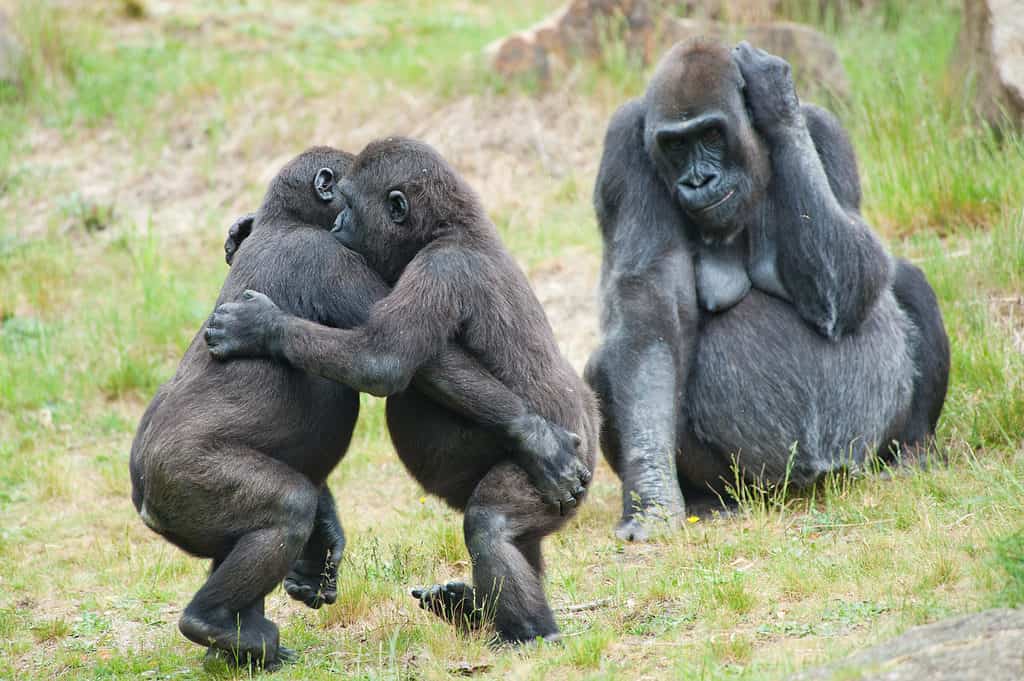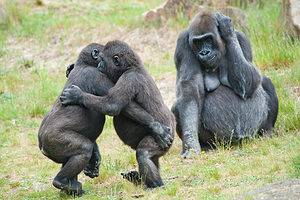When the thought of a gorilla initially comes to mind, soon follows the iconic image of the primate beating its chest profusely. This sound and visual is directly linked to these creatures, and for good reason. However, there is no one simple answer as to why gorillas pound their chests. Instead, it is a culmination of many different communicative intentions. In this article, we’ll be breaking down five such intentions one by one. Then, we will hopefully learn a thing or two about how our second closest living relatives interact with one another.
Brief Gorilla Background

Did you know that the gorilla is genetically one of the closest living relatives to humanity?
©Martin Prochazkacz/Shutterstock.com
You might consider gorillas to be far off from humans in terms of their behavior and anatomy. This might be partially true, but the fact is that humans share a whopping 98% of our DNA with these creatures. Our second closest living relatives (besides the chimpanzee), these primates have a lot more in common with us than we may initially think.
Gorillas come in two species: Eastern and Western. The Eastern Gorillas reside in the mountains within regions like Rwanda, Uganda, and the Democratic Republic of the Congo. On the other hand, the Western Gorillas prefer forest environments like Guinea, Gabon, and the Central African Republic. Generally speaking, both of these species enjoy climates that are tropical or subtropical.
This article is going to primarily focus on the gorillas’ social structure and communication methods. These creatures usually live in groups called troops or bands, and these groups typically consist of a single male alongside a collection of females and young gorillas. The leader of these groups is this singular male, who serves as the protector. In this structure, the male makes the important decisions surrounding places to sleep or areas to hunt in.
Gorilla Communication Methods
Gorillas are fascinating because they employ many different kinds of communication methods. They have verbal cues, like grunting and roaring, as well as facial expressions meant to convey certain emotions. This kind of sophisticated communication isn’t universal and is part of what makes gorillas so distinct.
In this next section, we’ll delve into the most iconic form of communication these gorillas exhibit: Chest beating. There are many reasons why gorillas pound their chests, and this non-verbal form of communication dominates people’s thoughts surrounding the primate.
Reasons Why Gorillas Pound Their Chests

The beating of the chest is an iconic image that many closely associate with gorillas. For good reason, too, as this is a commonly demonstrated behavior.
©Tanya Puntti/Shutterstock.com
1. To Display Dominance
The first reason why gorillas pound their chest is one that you probably could’ve guessed- to show off. This is a way for alpha gorillas, or silverbacks, to display their dominance and power. It asserts the gorillas’ authority and reinforces their leadership status. It’s symbolic in this way and is a show of strength for these gorillas.
The reverberating sound is usually commenced once a silverback is feeling, in some way, challenged. This could be from a rival or from an outside threat. It’s not uncommon for a younger male within the troop to challenge the leader’s authority, and when this happens, it is usually met with this pounding behavior.
We will elaborate on this later, but the sound emitted by the chest-beating can travel great distances. The moment that the silverback of a particular group can sense that there is another troop nearby, they may beat their chest to make a sort of claim over the territory in which they are residing.
These gorillas don’t joke around with their competitive abilities, either. Research conducted in Rwanda revealed that after closely studying the frequencies emitted by the chest beats, none of the gorillas were bluffing. Smaller gorillas emitted specific wavelengths, and larger gorillas had ones that were particular to their size, too. This means that, definitively, a reason why gorillas pound their chest is to nonverbally display that they are a certain size.
2. To Attract Mates
Chest pounding isn’t just a display of dominance to other male gorillas, but it’s also a display of physical prowess meant to garner the attention of surrounding females. This form of communication is a pretty crucial part of the gorilla’s courtship process, especially since the mating season for gorillas can get pretty intensely competitive.
Gorillas utilize chest pounding to attract the attention of females because the act of creating these intensely powerful beats signifies a few things. Obviously, being able to produce these rhythmic frequencies shows that the gorilla possesses a level of physical strength, but it also conveys that these males have general genetic fitness and health. Female gorillas definitely don’t want a partner that can’t protect them!
You see, the female gorillas effectively get their pick of the litter. They are ultimately the ones to choose their sexual and reproductive partner, which means that males really need to put on their game face come mating season. Observations suggest that females are more likely to choose males who have more frequent, strong chest pounding. Besides the reasons we already listed, it’s believed that these gorillas have higher levels of testosterone and more likelihood of reproductive success.
3. To Warn Others
We know that chest pounding is obviously something that emits an insanely loud noise. Because of this, it serves as a great emergency alarm to the gorilla troop. Often used to communicate the presence of threats, silverbacks may pound their chest to warn the gorillas in their troop of incoming danger. This kind of quick response is vital! Gorillas live in environments where dangers are abundant and can present themselves quickly.
The kinds of threats that trigger this chest pounding are many. These can be human intruders, which often threaten gorillas and their habitats due to poaching and resource conflicts. Or, it can be one of the gorilla’s few natural predators. One such predator is the leopard, which is known to hunt gorillas in the wild. These wildcats can cause a lot of damage to a troop if it is caught off guard. Chest pounding is key in these situations because acting fast is the only way to survive.
4. To Express an Emotion

When young gorillas interact, this playful behavior can include chest pounding.
©Eric Gevaert/Shutterstock.com
Gorillas don’t always pound their chest because they want to mate or because they’ve identified a threat. Sometimes, gorillas pound their chest because it’s a genuine way for them to release emotions. As we’ve mentioned, it’s a form of communication for these creatures. It can communicate an individual’s emotional state and allow the gorillas to share the way in which they are feeling with others.
Gorillas have a range of emotions. They can be excited, frustrated, or agitated, just like humans. That’s why a reason why gorillas pound their chest can be to release this pent-up energy.
Chest pounding is also key to play and social bonding for young gorillas. These gorillas will pound their chest during playful interactions, and behavior like this is key to their social development. It helps them to learn the norms and rules of their troop, and it can also help with the development of their coordination and strength.
5. To Help Navigate
Our last reason why gorillas pound their chest is slightly less prominent than the rest but just as fascinating. The habitats that gorillas reside in are quite large, so navigation is essential. Chest pounding is a sound that is both distinct and far-reaching, so it definitely plays a part in helping gorillas locate one another, even across great distances.
Depending on a variety of factors, like terrain and atmospheric conditions, the sound of a gorilla pounding its chest can travel several kilometers in length. That’s pretty far, especially if it’s a sound that you can easily recognize. This kind of range is vital to keep the troop coordinated and cohesive, especially in areas that may be unfamiliar.
The photo featured at the top of this post is © Marian Galovic/Shutterstock.com
Thank you for reading! Have some feedback for us? Contact the AZ Animals editorial team.





